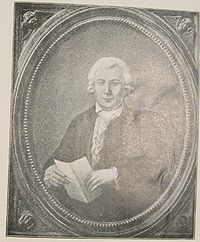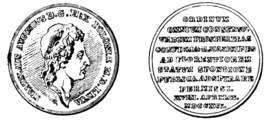
Black Procession
Encyclopedia

Demonstration (people)
A demonstration or street protest is action by a mass group or collection of groups of people in favor of a political or other cause; it normally consists of walking in a mass march formation and either beginning with or meeting at a designated endpoint, or rally, to hear speakers.Actions such as...
held by burghers
Bourgeoisie
In sociology and political science, bourgeoisie describes a range of groups across history. In the Western world, between the late 18th century and the present day, the bourgeoisie is a social class "characterized by their ownership of capital and their related culture." A member of the...
in Polish-Lithuanian Commonwealth
Polish-Lithuanian Commonwealth
The Polish–Lithuanian Commonwealth was a dualistic state of Poland and Lithuania ruled by a common monarch. It was the largest and one of the most populous countries of 16th- and 17th‑century Europe with some and a multi-ethnic population of 11 million at its peak in the early 17th century...
's capital of Warsaw
Warsaw
Warsaw is the capital and largest city of Poland. It is located on the Vistula River, roughly from the Baltic Sea and from the Carpathian Mountains. Its population in 2010 was estimated at 1,716,855 residents with a greater metropolitan area of 2,631,902 residents, making Warsaw the 10th most...
on 2 December 1789, during the Great Sejm
Great Sejm
The Great Sejm, also known as the Four-Year Sejm was a Sejm of the Polish-Lithuanian Commonwealth that was held in Warsaw, beginning in 1788...
. It vastly constributed to the passage of a belated major urban reform
Free Royal Cities Act
The Free Royal Cities Act was an act adopted by the Four-Year Sejm of the Polish-Lithuanian Commonwealth on April 18, 1791, in the run-up to the adoption of the...
.
The procession that took place Warsaw
Warsaw
Warsaw is the capital and largest city of Poland. It is located on the Vistula River, roughly from the Baltic Sea and from the Carpathian Mountains. Its population in 2010 was estimated at 1,716,855 residents with a greater metropolitan area of 2,631,902 residents, making Warsaw the 10th most...
on 2 December 1789 was inspired by Hugo Kołłątaj, and led by Jan Dekert
Jan Dekert
Jan Dekert or Jan Dekiert was a Polish merchant, political activist and mayor of Warsaw . He was an activist arguing for more rights for the burghers in the Polish-Lithuanian Commonwealth, however he was also known as an opponent of Jewish merchants.He was born in the village of Bledzew. He...
. 294
representatives of 141 towns under royal charter (miasta królewskie), clad in black, passed peacefully (marching or in carriages) through the streets of Warsaw, from the town hall, reaching the Royal Castle
Royal Castle, Warsaw
The Royal Castle in Warsaw is a castle residency and was the official residence of the Polish monarchs. It is located in the Castle Square, at the entrance to the Warsaw Old Town. The personal offices of the king and the administrative offices of the Royal Court of Poland were located there from...
(were members of the Great Sejm
Great Sejm
The Great Sejm, also known as the Four-Year Sejm was a Sejm of the Polish-Lithuanian Commonwealth that was held in Warsaw, beginning in 1788...
were meeting) and getting an audience with the king Stanisław August Poniatowski. The burghers demanded similar privileges to those held by the nobles (szlachta
Szlachta
The szlachta was a legally privileged noble class with origins in the Kingdom of Poland. It gained considerable institutional privileges during the 1333-1370 reign of Casimir the Great. In 1413, following a series of tentative personal unions between the Grand Duchy of Lithuania and the Kingdom of...
). Their demands included the right to buy and own land estates, the right to be represented in the Polish parliament (Sejm
Sejm
The Sejm is the lower house of the Polish parliament. The Sejm is made up of 460 deputies, or Poseł in Polish . It is elected by universal ballot and is presided over by a speaker called the Marshal of the Sejm ....
) and reforms to the urban law. The procession influenced the Great Sejm to create a Commission for the Cities (Deputacja w sprawie miast).

Kraków
Kraków also Krakow, or Cracow , is the second largest and one of the oldest cities in Poland. Situated on the Vistula River in the Lesser Poland region, the city dates back to the 7th century. Kraków has traditionally been one of the leading centres of Polish academic, cultural, and artistic life...
) took part in the procession; the representatives of the private towns (owned by the magnate
Magnate
Magnate, from the Late Latin magnas, a great man, itself from Latin magnus 'great', designates a noble or other man in a high social position, by birth, wealth or other qualities...
s) did not.
Eventually, the burghers' cause succeeded and the belated urban reform in the Commonwealth took place with the passage of the Free Royal Cities Act
Free Royal Cities Act
The Free Royal Cities Act was an act adopted by the Four-Year Sejm of the Polish-Lithuanian Commonwealth on April 18, 1791, in the run-up to the adoption of the...
on 18 April 1791, which became a notable amendment to the Constitution of May 3
Constitution of May 3, 1791
The Constitution of May 3, 1791 was adopted as a "Government Act" on that date by the Sejm of the Polish–Lithuanian Commonwealth. Historian Norman Davies calls it "the first constitution of its type in Europe"; other scholars also refer to it as the world's second oldest constitution...
. The Act granted, to the Commonwealth's townspeople
City
A city is a relatively large and permanent settlement. Although there is no agreement on how a city is distinguished from a town within general English language meanings, many cities have a particular administrative, legal, or historical status based on local law.For example, in the U.S...
, personal security, the right to acquire landed property
Landed property
Landed property or landed estates is a real estate term that usually refers to a property that generates income for the owner without the owner having to do the actual work of the estate. In Europe, agrarian landed property typically consisted of a manor, several tenant farms, and some privileged...
, and eligibility for military officers' commissions
Officer (armed forces)
An officer is a member of an armed force or uniformed service who holds a position of authority. Commissioned officers derive authority directly from a sovereign power and, as such, hold a commission charging them with the duties and responsibilities of a specific office or position...
, public offices, and membership in the szlachta
Szlachta
The szlachta was a legally privileged noble class with origins in the Kingdom of Poland. It gained considerable institutional privileges during the 1333-1370 reign of Casimir the Great. In 1413, following a series of tentative personal unions between the Grand Duchy of Lithuania and the Kingdom of...
(nobility
Nobility
Nobility is a social class which possesses more acknowledged privileges or eminence than members of most other classes in a society, membership therein typically being hereditary. The privileges associated with nobility may constitute substantial advantages over or relative to non-nobles, or may be...
).

